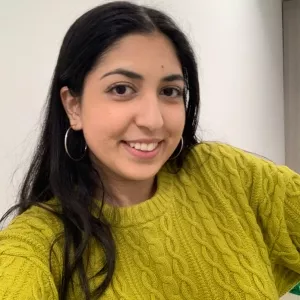
Artificial Intelligence for student support: MMI students place second in social innovation and AI competition
The rise of artificial intelligence (AI) tools and creative outlets for their use has been explosive, with an expansive innovation and learning curve touching every area of society. A team of students in IMI’s Master of Management of Innovation Program has proposed an inspiring AI tool designed to help students seeking support for student and human rights, winning second place in the University of Toronto’s Global Learning Case Competition for their work.
Sarah Asim (MMI ‘24), Tanisha Batra (MMI ‘24) and their teammates Erik Laicher (University of Stuttgart) and Juan Ricardo Rosas Mendoza (Universidad Nacional Autónoma de México) created “AI Student Rights Assistant (AISRA) - Navigate Your Rights With Ease,” an AI assistant designed to assist students seeking resources, tools and guidance for discrimination, harassment, academic policy and more.

“Students encounter various issues including financial aid, housing, lack of familiarity with academic policies and procedures.... it becomes hard to navigate the large university database and locate answers to student-specific information”, says Sarah. Adds Erik, about all the elements to navigate when starting at university, “all these things are barely taught at school, and while many students might be able to ask their parents, not everyone comes from an academic family who knows all this stuff, or your parents might be from a different country, having issues with the language and bureaucracy themselves.” Having a tool, the team felt, would help students to find what they need more effectively, and inclusively (“without,” Sarah notes, “promising legal advice”).
The tool accepts inputs from users through a ticket, and generates information on the policies, legal resources, compliance, and regulations pertinent to the user’s challenge or question. It offers details on further contacts and appropriate resources for next-steps, enabling students to not only quickly find accurate information about traditionally complicated and difficult-to-navigate situations, but also helps them to find the right person to talk to easily. Anyone who has tried to find both policies and the correct person to ask about them knows this is difficult in the best of times; the added strain of complicated or hurtful scenarios makes this even more taxing. A tool like AISRA provides a way to make this process easier, and more inclusive, enabling students to get help and information faster, and with less complexity.
Sarah and Tanisha’s team were particularly interested in how their tool could support marginalized, underrepresented, or otherwise often-overlooked groups. “Many resources that inform students of their rights are quite expensive, both monetarily and time-wise," says Tanisha, and can “be inequitable to low-income and diverse student groups.”

The Global Learning Case Competition is designed to inspire teams to generate innovative and sustainable solutions to global challenges using AI. Teams were challenged to come up with an AI solution for positive societal change, while addressing the biases and difficulties inherent with existing AI tools, and embedding a focus on inclusivity. Sarah was motivated to participate in this competition due to “its emphasis on how AI can be used in positive ways.... [and to explore] how AI can lead to process improvements in a timely manner.” Tanisha agrees, sharing that part of the beauty of this competition, and the ability to work on this proposal, was “the focus on AI, and how it can be used for the better.” The competition also offered a global focus, enabling the students to work with teammates from around the world, creating an interdisciplinary, international view of the challenges at hand. Erik praised the dynamic nature of the competition and the opportunity to work with teammates from around the world; “I liked the idea of working together with students from all around the world with all kinds of backgrounds,” he says. “We quickly had a product that really amazed us. That was a very cool experience.” Sarah, Tanisha and Erik encourage others to engage in similar challenges, agreeing that the experience went well beyond an addition to their resumes. “Stepping out of your comfort zone can be a rewarding experience,” says Sarah, who didn't have a background in AI before joining. “You may be skilled in ways you don’t know, and novel situations may be the best way to see where you excel.” She plans to take this experience forward to work in project management and consulting.
Tanisha, for her part, plans to continue to use her AI skills to help humanity, focusing on social and environmental issues. “[I joined] the MMI Program... to use my AI, data science and digital enterprise management skills to help humanity, whether by tackling social or environmental issues,” she says. She’s already working with a startup using AI to empower knowledge organizations with tools to collaborate and make positive impact on mental health and organizational efficiency and looks forward to a career “building human-centered solutions with amazing people like Sarah, Ricardo and Erik.”
“Fear of new technologies is natural but leveraging these innovations to improve working conditions is just as interesting”, says Sarah. “Take new opportunities,” she says, when asked for advice for students considering this kind of experience. “Winning is a bonus, but the real value lies in the connections you make and the knowledge you gain along the way!”
Learn more about the Global Learning Case Competition and the MMI Program.
